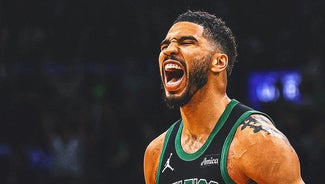
Hawks tripped up by Wizards in series opener, lose home-court advantage
ATLANTA -- Walking out through the tunnel and into the hallway that separates Philips Arena's court from its home locker room, Kyle Korver's fist hit the handle on an open door as he passed in frustration. The door, released from its magnetic lock, slowly swung to a close behind the veteran wing and the rest of a Hawks team that now faces an series deficit without home-court advantage. Atlanta is heading back to the drawing board.
Frustration was the emotion of choice following another fourth-quarter disappearing act from the Eastern Conference's No. 1 seed, the latest such occurrence being the most conspicuous of the bunch.
In their 104-98 loss to the red-hot Washington Wizards, the 5-seed that has still yet to suffer a loss this postseason, the Hawks coughed up a home halftime lead for the first time this season. They were clicking, then they weren't. They were leading -- big, at times -- then they weren't. Korver's fist personified the resulting sentiment.
Scoring 35 second-half points on 25 percent shooting leaves a bitter taste.
"First half, we really had control of this game. Third quarter, middle of the third quarter, we had control. And we kinda just let it slip away," said DeMarre Carroll, who scored a team-high 24 points in the loss. "We had our foot on the gas and we kinda let loose, let them catch up. And once they caught up, they've got some good players."
Added Hawks center Al Horford: "I'm not going to make excuses. You gotta to give that team credit. They played better than us tonight. They kept fighting, they found a way. We have to be better as a team."
Atlanta is looking to make franchise history in this seven-game set with the Wizards, seeking its first Eastern Conference finals appearance, but, despite improving through the first round and flexing some first-half muscle in the Washington opener, its postseason demons linger. The Hawks held a double-digit lead with six minutes remaining in the third quarter on Sunday. Two minutes into the fourth, that lead was gone. It's been their big-picture Achilles heel this postseason -- the inability to sustain or build upon late leads.
Following a Game 6 clinic in the Nets finale, the Hawks continue to be hit-or-miss, largely contingent upon whether the starting five is playing together or not. According to ESPN Stats & Info, in the Brooklyn series, the Hawks starting lineup outscored the Nets by 46 points in 110 minutes while all other lineup combinations employed by coach Mike Budenholzer posted a negative-13 in plus-minus. Essentially, it's a problem that the starting five can't play 48 minutes together.
A similar trend played out on Sunday afternoon.
Atlanta's bench without standout wing Thabo Sefolosha, who remains out for the playoffs after fracturing his leg in an altercation with police in New York City, has been spotty at best during the playoffs. There have been temporary bright spots -- Pero Antic stretching the floor with quality shooting, Kent Bazemore on a few defensive possessions, Dennis Schroder avoiding mistakes and filling the box score (nine points, four assists, three rebounds) against the Wizards -- but the drop-off is significant. And damaging.
Two questions come out of this loss, the third the Hawks have suffered in seven playoff games: (1) Can the Hawks get past the Wizards and continue to threaten the East without better bench play and/or (2) should Budenholzer be leaning more heavily on the Teague-Korver-Carroll-Millsap-Horford group to pull off something never done before in team history? The starters, true to narrative, dominated Washington when on the floor together, but they only shared the floor for about 20 minutes. Budenholzer contends that his rotation has not undergone any major changes since the 60-win regular-season, but perhaps it should moving forward.
Playing without home-court advantage against a Washington team that is playing its best basketball might require heavier workloads for top talent.
Things worked out against the Nets, and very few teams could have overcome Atlanta's Game 6 performance in that series, but the Hawks need to find greater balance and consistency. In all four home games this postseason, leads have diminished in the fourth quarter. That's come primarily from the inefficiency of mixed-and-matched lineups in lead-preservation mode. The Nets cut into deficits by controlling the tempo and executing. Washington doesn't mind Atlanta's pace. Instead, Wall and Beal, the Wizards talented (and injury-hampered) backcourt, punished the Hawks with moments of individual brilliance, combining for 46 points, 14 assists and 14 rebounds to steal Game 1.
Future defensive challenges from Wall and Beal withstanding, Carroll echoed Budenholzer's comments following the earlier losses to Brooklyn -- the "missed opportunities" angle -- and therein lies the positives the team can take into Tuesday. Unlike issues such as offensive stagnation and defensive miscues, the Hawks' main problem, outside of its continued lackluster play from the bench, was fairly simple: They missed good looks. Even while forcing just six turnovers, which typically lead to easy baskets, the Hawks were not completely out of sync.
The Wizards argued they ran into similar problems, but Atlanta is rarely (if ever) held to 35 points over 24 minutes when the ball is moving effectively.
"Sometimes the game boils down to some makes and misses," Wizards coach Randy Wittman said. "I'm not going to sit here and tell you that they didn't miss some good looks. We missed some good looks. That's kind of the nuts and bolts of it."
Atlanta remains a frustrated favorite, but Washington called into question the Hawks' balance-focused modus operandi in Game 1: Does the regular-season process have to be altered to sustain postseason success? Their response could define the series, as well as the rest of this playoff run.
"We're still a confident group," Carroll said. "We know we let one slip away."






